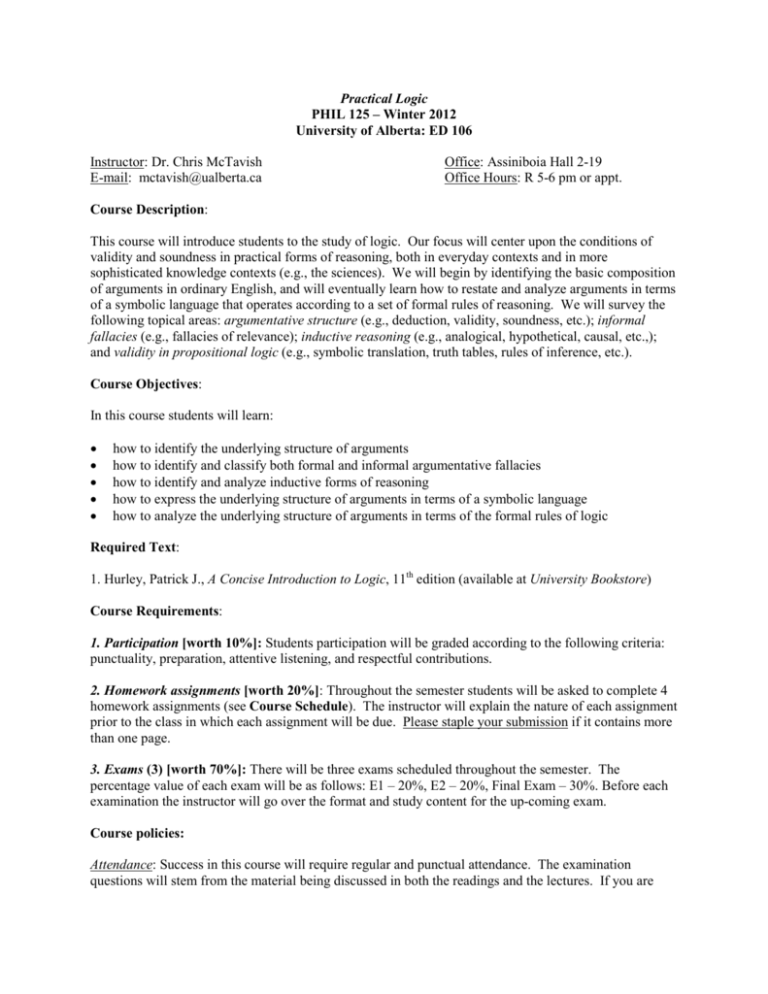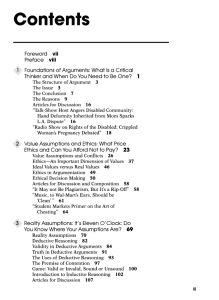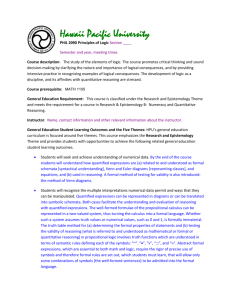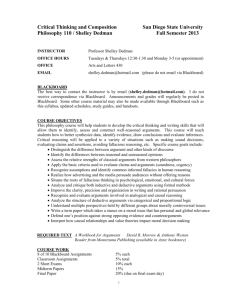Practical Logic PHIL 125 – Winter 2012 University of Alberta: ED
advertisement

Practical Logic PHIL 125 – Winter 2012 University of Alberta: ED 106 Instructor: Dr. Chris McTavish E-mail: mctavish@ualberta.ca Office: Assiniboia Hall 2-19 Office Hours: R 5-6 pm or appt. Course Description: This course will introduce students to the study of logic. Our focus will center upon the conditions of validity and soundness in practical forms of reasoning, both in everyday contexts and in more sophisticated knowledge contexts (e.g., the sciences). We will begin by identifying the basic composition of arguments in ordinary English, and will eventually learn how to restate and analyze arguments in terms of a symbolic language that operates according to a set of formal rules of reasoning. We will survey the following topical areas: argumentative structure (e.g., deduction, validity, soundness, etc.); informal fallacies (e.g., fallacies of relevance); inductive reasoning (e.g., analogical, hypothetical, causal, etc.,); and validity in propositional logic (e.g., symbolic translation, truth tables, rules of inference, etc.). Course Objectives: In this course students will learn: • • • • • how to identify the underlying structure of arguments how to identify and classify both formal and informal argumentative fallacies how to identify and analyze inductive forms of reasoning how to express the underlying structure of arguments in terms of a symbolic language how to analyze the underlying structure of arguments in terms of the formal rules of logic Required Text: 1. Hurley, Patrick J., A Concise Introduction to Logic, 11th edition (available at University Bookstore) Course Requirements: 1. Participation [worth 10%]: Students participation will be graded according to the following criteria: punctuality, preparation, attentive listening, and respectful contributions. 2. Homework assignments [worth 20%]: Throughout the semester students will be asked to complete 4 homework assignments (see Course Schedule). The instructor will explain the nature of each assignment prior to the class in which each assignment will be due. Please staple your submission if it contains more than one page. 3. Exams (3) [worth 70%]: There will be three exams scheduled throughout the semester. The percentage value of each exam will be as follows: E1 – 20%, E2 – 20%, Final Exam – 30%. Before each examination the instructor will go over the format and study content for the up-coming exam. Course policies: Attendance: Success in this course will require regular and punctual attendance. The examination questions will stem from the material being discussed in both the readings and the lectures. If you are unable to attend a class then I strongly encourage you to find a fellow classmate who will lend you his or her notes. Missed Examination Policy: If a student is going to miss a scheduled examination, it is the responsibility of the student to notify the instructor prior to the time of the scheduled exam. If the reason for the absence is justifiable (e.g., emergency or health reasons) then an alternative exam time will be set-up for the student. If the reason is not justifiable, then the student will receive a grade of “F” for that exam. Electronic Devices: Any use of a lap-top computer is strictly for the purposes of taking notes. Do not use your lap-top for recreational purposes during class time (e.g., e-mail, games, web-surfing, facebook, etc.,). It is distracting, disruptive and disrespectful. Cell-phones, pagers, Ipods, etc., are to be turned off before class begins. If you insist upon using electronic devices for recreational purposes during classtime then you can expect deductions in your participation / preparation grade for this course. Academic Integrity: This course will be conducted in accordance with the General Faculties Council (GFC) statement on academic integrity: “The University of Alberta is committed to the highest standards of academic integrity and honesty. Students are expected to be familiar with these standards regarding academic honesty and to uphold the policies of the University in this respect. Students are particularly urged to familiarize themselves with the provisions of the Code of Student Behavior (online at www.ualberta.ca/secretariat/appeals.htm) and avoid any behavior which could potentially result in suspicions of cheating, plagiarisms, misrepresentation of facts and / or participation in an offence. Academic dishonesty is a serious offence and can result in suspension or expulsion from the University” (GFC 29, September 2003). Disability Services: Students who require accommodations in this course owing to a disability affecting mobility, vision, hearing, learning, or mental or physical health are advised to discuss their needs with Specialised Support and Disability Services, 2-800 SUB (ph. 492-7269). University’s Course Outline Policy: Policies about course outlines can be found at 23.4(2) of the University Calendar. Please come see me if you have any questions about course outlines. Evaluation: Grades will be distributed accordingly: Excellent A+ A A- 4.0 4.0 3.7 96-100 92-95 88-91 Satisfactory C+ C C- 2.3 2.0 1.7 72-75 68-71 64-67 Good B+ B B- 3.3 3.0 2.7 84-87 80-83 76-79 Poor Minimal Pass Fail D+ D F 1.3 1.0 0.0 60-63 50-59 49 and below In accordance with GFC policy (23.4), if students wish to access past or representative course material they may do so by contacting the instructor. Grades will not be distributed on a curve. Consultation: I am available during office hours or by appointment for consultation. Consider making use of my availability. Together we can likely work out any difficulties you might be having with the course. I look forward to the opportunity to discuss any of this material with you. Course Schedule (tentative – please note that this Course Schedule is subject to change at the instructor’s discretion. Any changes will be announced by the instructor during the term): Jan. 12 - Introduction to the course Jan. 19 - “Basic Concepts,” Chapter 1: 1.1 – 1.4 Reading: pp. 1-53 Jan. 26 - Chapter 1: 1.5; “Meaning and Definition,” Chapter 2: 2.1, 2.3, and 2.3 Reading: pp. 57-63 and pp. 78-99 HOMEWORK #1 due Feb. 2 - EXAM I Reading: No reading assigned Feb. 9 - “Informal Fallacies,” Chapter 3: 3.1 – 3.4 Reading: pp. 119-170 Homework #2 due Feb. 16 - Chapter 3: 3.5; “Inductive Reasoning,” Chapter 9: 9.1 – 9.3 Reading: pp. 178-184 and pp. 509-520 Feb. 23 - No class (Reading Week) Mar. 1 - “Causality,” Chapter 10; “Hypothetical Reasoning, ”Chapter 13: 13.1 - 13.4 Reading: pp. 529-546 and pp. 593-607 Homework #3 Due Mar. 8 - EXAM II Reading: No reading assigned Mar. 15 - “Propositional Logic,” Chapter 6: 6.1 – 6.4 Reading: pp. 310-347 Mar. 22 - Chapter 6: 6.5 and “Natural Deduction,” Chapter 7: 7.1 – 7.2 Reading: pp. 350-360 and 380-396 Homework #4 due Mar. 29 - Chapter 7: 7.3; Review Reading: pp. 401-407 Apr. 5 - Review / catch-up Apr. 12 - FINAL EXAM - 6pm.(please be sure to verify the date, time and location of this final exam as the exam date approaches) Disclaimer: The information in this Course Outline is subject to change and any change will be announced in class.






